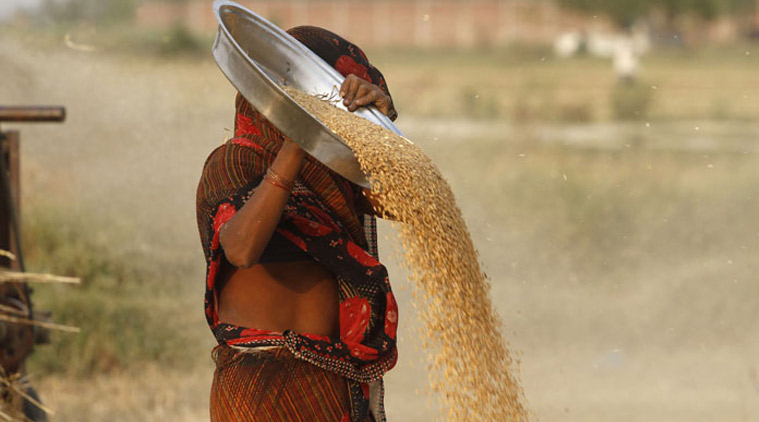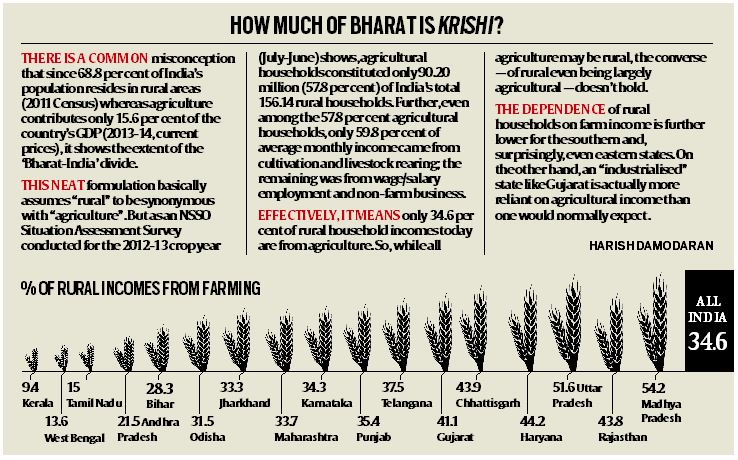- India
- International
The Failing Fields: Bonus withdrawal bites Madhya Pradesh farmers this time
Policy played a major role in helping the state claim no. 2 spot in wheat procurement.
 For the 2014-15 crop currently being marketed, the Centre’s MSP has been raised marginally to Rs 1,450 per quintal, but there’s no bonus.
For the 2014-15 crop currently being marketed, the Centre’s MSP has been raised marginally to Rs 1,450 per quintal, but there’s no bonus.
For Sandeep Baghel, the spanking state-of-the-art silos about 8 km from the mandi here are symbolic of the sheer transformation in the infrastructure for procurement and storage of grains, from the chaos of the past when farmers like him spent days on end to sell their wheat to state agencies.
But the awe inspired by the newly-built galvanised steel storage structures — four of 12,500 tonnes each — cannot compensate for the disappointment from lower prices as well as crop yields this time.
Last year, there was no damage to his wheat from unseasonal rains and hailstorm. More important, the Madhya Pradesh (MP) government paid a Rs150 bonus over and above the Centre’s minimum support price (MSP) of Rs 1,400 per quintal.
[related-post]
For the 2014-15 crop currently being marketed, the Centre’s MSP has been raised marginally to Rs 1,450 per quintal, but there’s no bonus. Sandeep’s produce of about 150 quintals is nearly 100 quintals less than last year, which he attributes to the Uparwala (the almighty). “Nobody can anticipate what He has in mind. But the removal of bonus I cannot come to terms with,” says this farmer from Bishan Kheda, a village in neighbouring Raisen district.
 The bonus policy — introduced by the BJP government under Shivraj Singh Chauhan in the 2007-08 crop year and discontinued from this season — played a significant part in MP leapfrogging to No. 2 position in wheat procurement, behind only Punjab. Government purchases from the state swelled from a mere 57,000 tonnes in 2006-07 (crop year) to 7.1 million tonnes in 2013-14, while hitting a peak of 8.5 million tonnes in 2011-12 (see chart).
The bonus policy — introduced by the BJP government under Shivraj Singh Chauhan in the 2007-08 crop year and discontinued from this season — played a significant part in MP leapfrogging to No. 2 position in wheat procurement, behind only Punjab. Government purchases from the state swelled from a mere 57,000 tonnes in 2006-07 (crop year) to 7.1 million tonnes in 2013-14, while hitting a peak of 8.5 million tonnes in 2011-12 (see chart).

Apart from helping MP bag the Krishi Karman Award for excellence in foodgrain production, instituted by the previous UPA government, during three consecutive years from 2011 to 2013, the bonus policy also bolstered Chauhan’s pro-kisan image.
But the populist measure also had its adverse impact of driving away private players from MP. While the state was always known for producing premium quality sharbati wheat, the bonus on top of MSP made even normal FAQ (fair average quality) wheat from MP expensive relative to other states — including neighbouring Uttar Pradesh, where farmers were not receiving even the Centre’s MSP.
 As even Rajasthan joined the act of announcing bonus for wheat, the Centre was forced to crack down on what it considered to be a market-distortive practice. The decision not to accept any surplus grain for the Central pool from states declaring bonuses was, ironically, taken by the new Narendra Modi-led BJP government.
As even Rajasthan joined the act of announcing bonus for wheat, the Centre was forced to crack down on what it considered to be a market-distortive practice. The decision not to accept any surplus grain for the Central pool from states declaring bonuses was, ironically, taken by the new Narendra Modi-led BJP government.
The effect of that crackdown is now being felt by farmers, who for the first time in seven years are not getting an incentive they had taken for granted. “It was good to get bonus. I don’t know why they have suddenly stopped paying it,’’ asks Rambabu Dangi, a 40-year-old farmer from Baver village in Raisen’s Gairatganj tehsil.
Baghel and Dangi are among the many who had, in recent times, shifted to FAQ wheat cultivation in a big way in response to assured government procurement at MSP-plus-bonus rates. While some may have been aware there would no longer be any bonus, the real impact sunk only after taking their harvested crop to the mandis.
Makhan Singh Malviya, a farmer from Mehdon village in Gyaraspur tehsil of Vidisha, would not have thought twice about selling his entire wheat to the government’s purchase centre had he got Rs 1,600 per quintal after adding last year’s bonus. But with the bare MSP of Rs 1,450, he tried his luck at the mandi in the hope of getting more from traders. It did not work though.
 “Since natural causes have taken their toll on quality, farmers have been left with no option but to sell at the MSP. This is more so, when traders are offering much less for the same quality of produce,” notes former Agriculture Department director, GS Kaushal.
“Since natural causes have taken their toll on quality, farmers have been left with no option but to sell at the MSP. This is more so, when traders are offering much less for the same quality of produce,” notes former Agriculture Department director, GS Kaushal.
According to him, the idea of bonus on wheat was flawed in the first place, because farmers in MP should have been encouraged to produce oilseeds and pulses that India now significantly imports. “The state government should not think of awards (for grain production), but have the genuine welfare of its farmers’ in mind by encouraging them to sow premium wheat varieties such as sharbati and durum,” Kaushal adds.
Chauhan, on his part, has repeatedly assured farmers that he will find an alternative to bonus by compensating their losses on this count. When asked how, he informs that “we are working out a formula”, but without elaborating. His constant refrain is, “we won’t let the farmer suffer”.
But that’s easier said than done. The Opposition Congress has already cornered the chief minister by repeatedly reminding how he has been “forced” to stop paying bonus by the government at the Centre headed by his own party, while daring him to take to the streets as he did when the UPA was in power.
Must Read
Apr 19: Latest News
- 01
- 02
- 03
- 04
- 05






































